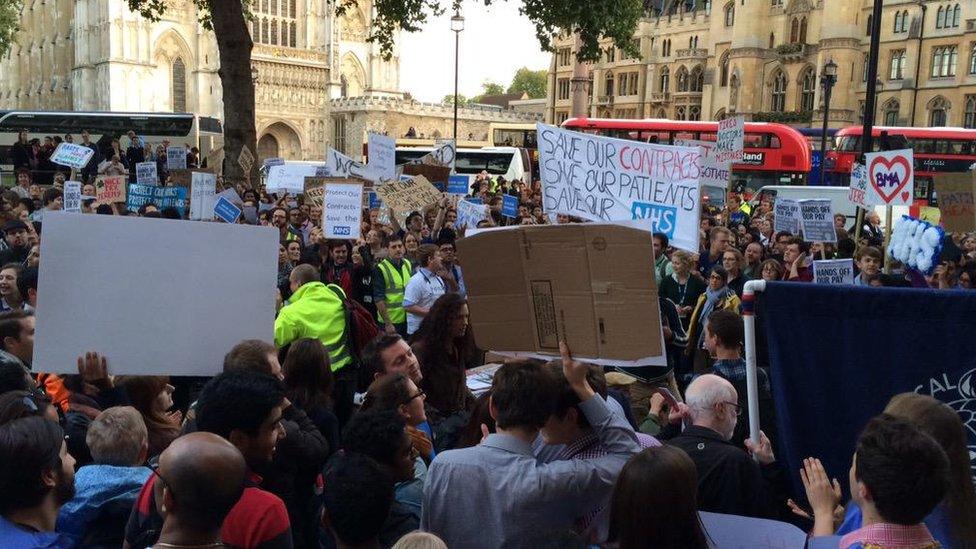The government, the BMA and the junior doctors – where next?
- Published

Junior doctors have been venting their anger at the government's proposals
Taking the temperature in the dispute between junior doctors and the Government results in something well above "normal". Protest marches in London, Nottingham and Belfast might well see some feverish rhetoric. But beneath the robust exchanges, where has this dispute got to and where might it go from here?
The claims and counter-claims over the proposed new contract for junior doctors in England have been well-documented.
The British Medical Association is adamant that it has not received sufficient assurances on protection against excessive hours and maintaining pay levels. The Department of Health stresses there is no plan to cut the paybill or make doctors work longer hours.
Most of the Royal Colleges have urged the doctors' representatives and NHS Employers to get back around the table. But given the stand-off over assurances and preconditions it is hard to see that happening any time soon.
The BMA says it won't agree to enter talks over a contract with elements which the government is trying to impose. Ministers respond by saying that the door is open to discuss the whole package.
Strident rhetoric
The main protagonists in disputes like this often trot out strident public rhetoric while taking a more conciliatory approach behind closed doors.
Health Secretary Jeremy Hunt in his first interviews on the subject, broadcast today, did not pull any punches. He told BBC News it was "incredibly disappointing the way the BMA has misrepresented the government's position". He said the BMA must return to the table to negotiate the best deal for doctors and patients.
The BMA's junior doctors leader, Dr Johann Malawana, shrugged off the suggestion he had been misleading his members: "Junior doctors have read the proposals themselves - if we were misrepresenting them junior doctors would be able to say what they thought and say it vociferously."
There seems little readiness on the part of the BMA to return to the talks which had run for two years up until the autumn of 2014, given its suspicions of the government's intentions.
Seven-day service
The question is how ministers will respond to the weekend's protests and the BMA's continuing planning for a ballot of members on industrial action.
There is a sense that Mr Hunt's patience is wearing a little thin. His latest interview is in effect an attempt to sidestep the BMA and appeal to the wider body of junior doctors in England.
He is insistent that an important reason for contract reform is delivering a better seven-day service in the NHS. He argues that, while junior doctors do already work at weekends, the current contract contains financial disincentives which deter employers from rostering more doctors on Saturdays and Sundays.
For their part junior doctors are firmly opposed to any deal which could leave some of them worse off. Mr Hunt has only said that a large majority of doctors will take home the same money following implementation of a new contract.
The doctors don't believe assurances, even from the Secretary of State, that they won't be made to work more hours in a week.
Undervalued?
A wider sense of dissatisfaction seems to be permeating the ranks of newly qualified medics. and those with several years of experience.
Some of them feel their qualifications and hard work are undervalued and there will be an exodus from the profession just when the NHS needs every available doctor. Their willingness to compromise seems limited.
Ministers firmly deny they are undermining the NHS. They acknowledge that junior doctors work extremely hard. They talk of wanting to reward doctors fairly while ensuring a new contract makes it easier to deliver care for patients.
Dividing lines are becoming clear. Feelings are running higher by the day. If talks don't start soon, the first industrial action over pay by doctors in 40 years will become increasingly likely.
- Published16 October 2015

- Published2 October 2015

- Published15 October 2015
